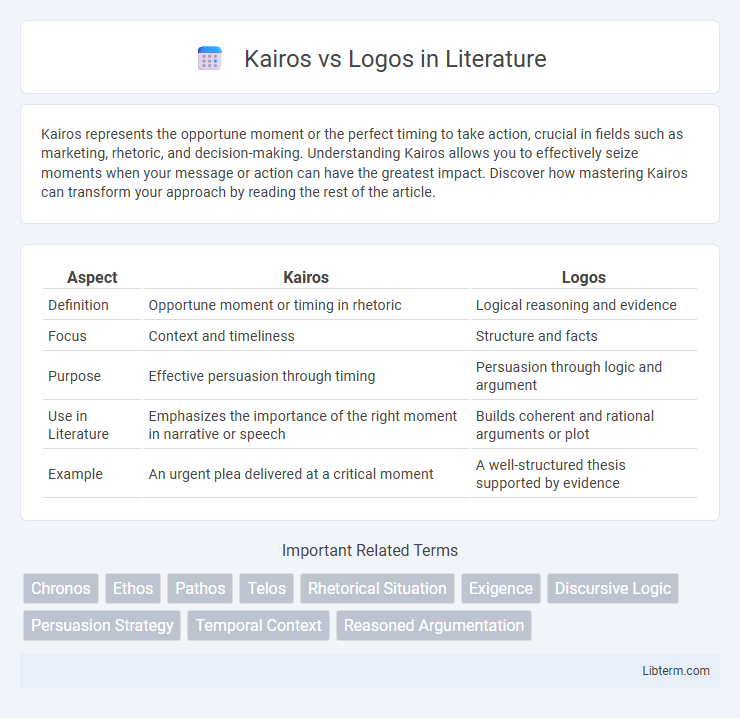Kairos represents the opportune moment or the perfect timing to take action, crucial in fields such as marketing, rhetoric, and decision-making. Understanding Kairos allows you to effectively seize moments when your message or action can have the greatest impact. Discover how mastering Kairos can transform your approach by reading the rest of the article.
Table of Comparison
| Aspect | Kairos | Logos |
|---|---|---|
| Definition | Opportune moment or timing in rhetoric | Logical reasoning and evidence |
| Focus | Context and timeliness | Structure and facts |
| Purpose | Effective persuasion through timing | Persuasion through logic and argument |
| Use in Literature | Emphasizes the importance of the right moment in narrative or speech | Builds coherent and rational arguments or plot |
| Example | An urgent plea delivered at a critical moment | A well-structured thesis supported by evidence |
Understanding Kairos: The Right Moment
Kairos represents the opportune moment when timing aligns perfectly with purpose, making communication or action most effective. Understanding Kairos involves recognizing situational context, audience readiness, and the urgency of delivery to maximize impact. This contrasts with Logos, which emphasizes logical argument and reasoning over timing, highlighting the strategic importance of seizing the right moment in persuasive communication.
Defining Logos: Power of Logical Appeal
Logos represents the power of logical appeal by using reasoning, facts, statistics, and evidence to persuade an audience effectively. It appeals to the audience's rationality, establishing credibility through coherent arguments and clear evidence. Emphasizing logos strengthens arguments by grounding claims in objective truth and analytical thinking.
Historical Origins of Kairos and Logos
Kairos and Logos originate from ancient Greek rhetoric, where Logos represents logical argument and reason, often linked to Aristotle's treatises on persuasion. Kairos, less formalized, signifies the opportune moment or timing for action, rooted in classical oratory and philosophy as the critical juncture for effective communication. Understanding the historical origins of Kairos and Logos reveals their complementary roles: Logos structures argument with evidence and logic, while Kairos dictates the strategic timing to maximize impact.
Kairos in Classical Rhetoric
Kairos in classical rhetoric refers to the opportune moment or the right timing to deliver a message effectively, emphasizing context and audience awareness to maximize persuasive impact. Unlike Logos, which relies on logical argumentation and evidence, Kairos highlights adaptability and seizing the perfect occasion to influence the audience's response. Mastery of Kairos enables speakers to tailor their rhetoric dynamically, ensuring relevance and resonance within specific situational contexts.
Logos as Persuasion Strategy
Logos, as a persuasion strategy, emphasizes logical reasoning and structured evidence to influence an audience effectively. It relies on facts, statistics, and clear arguments to establish credibility and convince through rational appeal. In contrast to Kairos, which focuses on timing and context, Logos targets the intellect by constructing coherent and compelling cases that withstand critical scrutiny.
Comparing Kairos and Logos in Communication
Kairos represents the critical timing and context of a message, ensuring communication occurs at the most effective moment to influence the audience. Logos emphasizes logical reasoning and evidence within an argument, focusing on clarity, structure, and factual support to persuade listeners. Comparing Kairos and Logos highlights how successful communication blends timely delivery with sound logic to enhance overall persuasive impact.
Practical Applications of Kairos
Kairos represents the opportune moment to act, emphasizing context and timing, which is essential for effective decision-making in marketing campaigns and crisis communication strategies. Its practical applications include tailoring messages to the audience's current needs and situational factors, thereby maximizing engagement and persuasive impact. Unlike Logos, which relies on logical reasoning and structured arguments, Kairos leverages timing to enhance rhetorical effectiveness in real-world scenarios.
Enhancing Arguments with Logos
Logos enhances arguments by employing logical reasoning, clear evidence, and structured data analysis to appeal to the audience's rationality. Utilizing statistics, facts, and deductive logic strengthens claims and fosters credibility in persuasive communication. Effective integration of logos ensures arguments are coherent, verifiable, and compelling, driving informed decision-making.
Integrating Kairos and Logos for Impact
Integrating Kairos and Logos enhances communication by aligning logical reasoning with the opportune moment, maximizing persuasive impact. Leveraging Kairos ensures that the argument resonates with the audience's current context, while Logos provides a solid foundation of evidence and rationality. This synergy drives more effective decision-making and persuasive outcomes in rhetoric, marketing, and leadership.
Choosing Kairos or Logos: Which to Use?
Choosing between Kairos and Logos depends on the context and audience of your communication. Kairos emphasizes the importance of timing and situational awareness, making it ideal for persuasive speech or messaging that requires immediate relevance and emotional impact. Logos prioritizes logical reasoning and evidence, best suited for analytical discussions where clarity, facts, and structured argumentation guide decision-making.
Kairos Infographic

 libterm.com
libterm.com